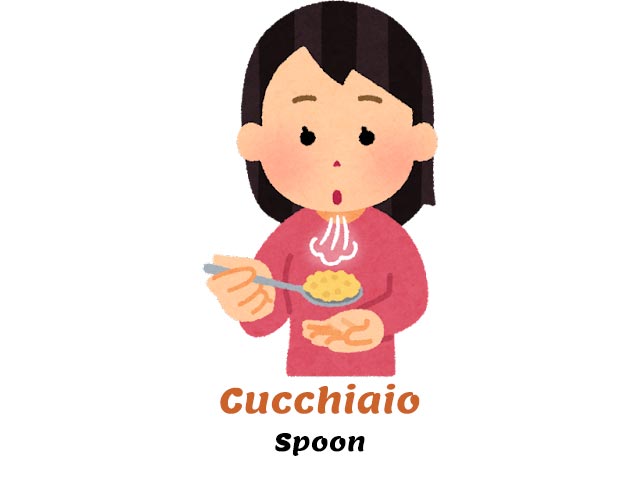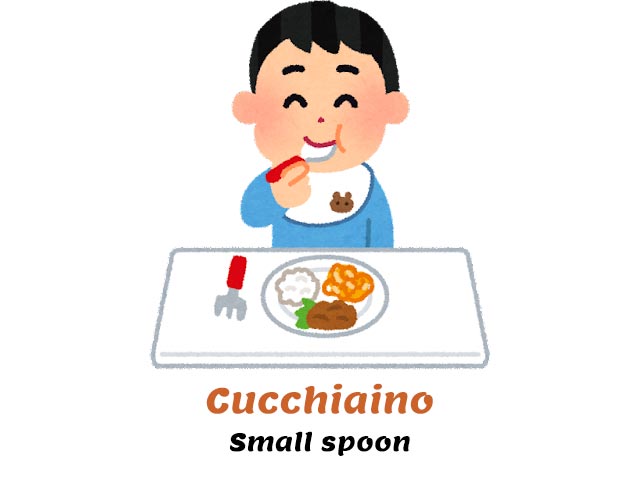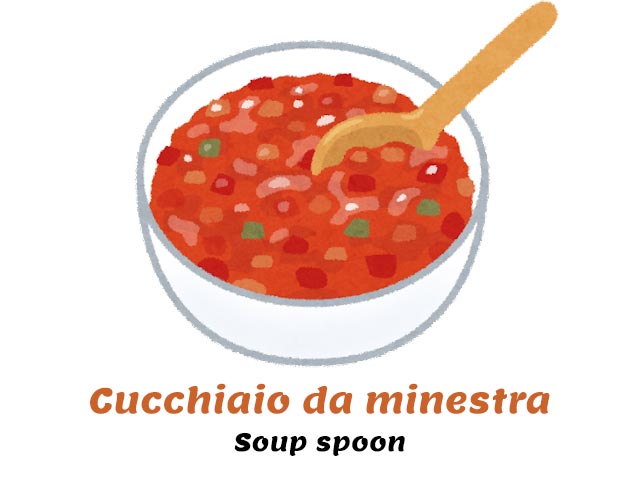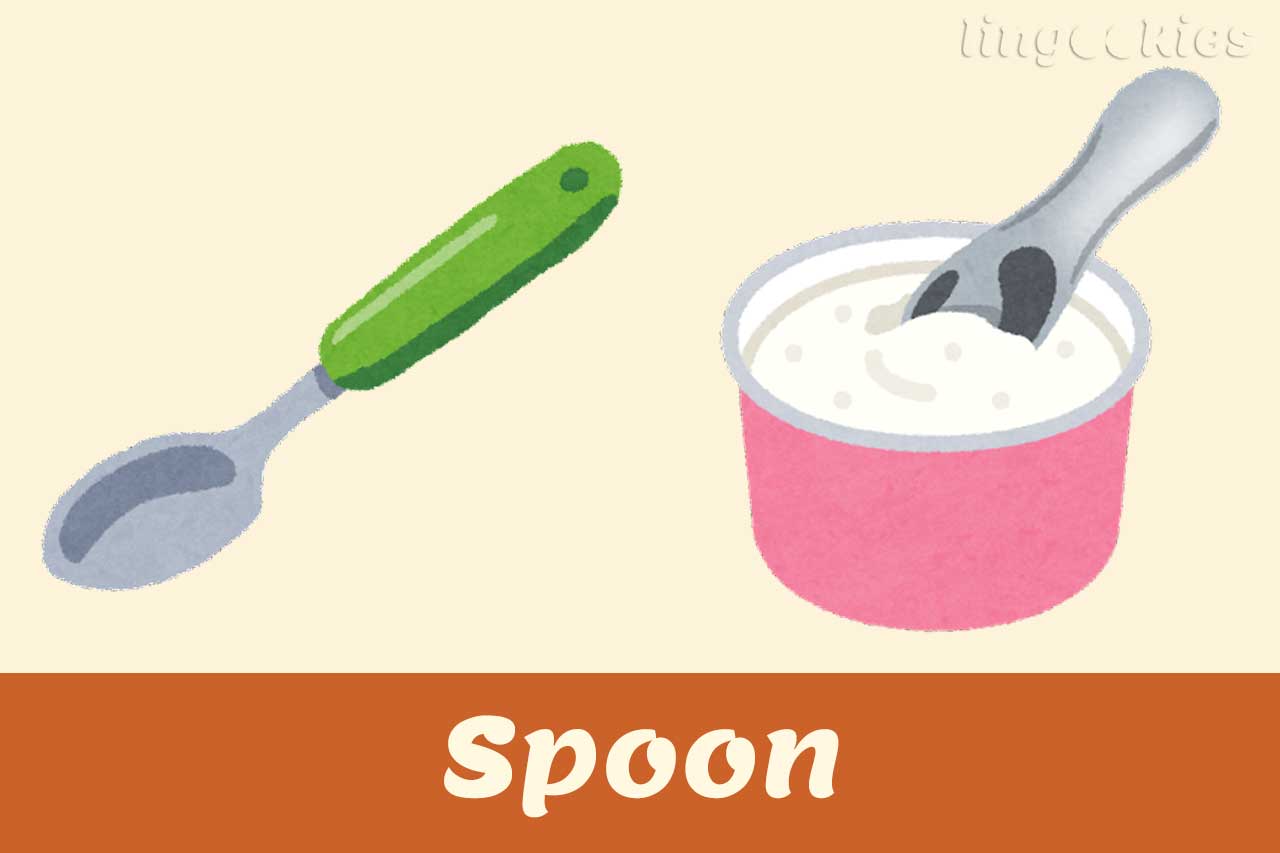Italian word of the day
| Pronunciation | |
| English translation | Spoon |
| Origin | From the Latin word cochlearium, “snail” |
Different forms of cucchiaio
Like most nouns in Italian, cucchiaio has two articles (definite or indefinite articles) and two numbers (singular or plural).
Un cucchiaio
A spoon
Dei cucchiai
Some spoons
Il cucchiaio
The spoon
I cucchiai
The spoons

Examples
| Di solito mangiamo con coltello, forchetta e cucchiaio. | We usually eat with a knife, fork and spoon. |
| Adele immerge il cucchiaio nella zuppa. | Adele dips her spoon in the soup. |
| Ho comprato una dozzina di cucchiai e due dozzine di forchette. | I bought a dozen spoons and two dozen forks. |
Related words
Cucchiaino is the diminutive form of cucchiaio (the -ino suffix in Italian makes things smaller).
| Cucchiaino | Small spoon |
While you would normally use a cucchiaio to eat soup, you will use a cucchiaino to eat ice cream or stir tea.
| Quali sono i cibi che si mangiano di solito con un cucchiaino? | What are some of the foods you usually eat with a small spoon? |
| Dove hai messo tutti i cucchiaini? | Where did you put all the spoons? |

Another translation for small spoon you can use is cucchiaietto, but it is not as common as cucchiaino which is the standard form.
Cucchiaione is the opposite of cucchiaino, as it means big spoon. It can also be used to translate big spoonful in colloquial language.
It is also a synonym for ladle, which is more commonly translated as mestolo.
| Cucchiaione | Big spoon |
Example:
| Si può inghiottire un cucchiaione di cannella senza tossire? | Can you swallow a big spoonful of cinnamon without coughing? |
The handle of the spoon, where you place your fingers, is called manico or, less commonly, impugnatura. Historically, this part was called codolo, but you don’t need to learn that!
| Manico | Handle, grip | |
| Impugnatura | Handle, grip |
Expressions
| Cucchiaio da minestra | Soup spoon | |
| Cucchiaino da tè | Tea spoon | |
| Cucchiaino da caffè | Coffee spoon |

Materials of a spoon in Italian
Spoons are made of many different materials and these are introduced in Italian by the preposition di, of. You can have…
Wooden spoons, i cucchiai di legno, are commonly used to stir pasta cooking in the boiling pot!
| Cucchiaio di legno | Wooden spoon | |
| Cucchiaio d’acciaio | Steel spoon | |
| Cucchiaio d’argento | Silver spoon | |
| Cucchiaio di plastica | Plastic spoon |
Cucchiaiata literally means spoonful into Italian, although we will still use cucchiaio or cucchiaino in our sentences (see the examples), even in recipes.
| Cucchiaiata | Spoonful |
Examples:
| Aggiungo sempre un cucchiaio di miele al mio tè. | I always add a spoonful of honey to my tea. |
| Ogni mattina aggiungo un cucchiaino di zucchero al mio caffè. | I add a small spoonful of sugar to my coffee every morning. |
| Aggiungere 3 cucchiai di vino bianco. | Add 3 tablespoons of white wine. |
Creamy sweets and desserts like puddings that are meant to be eaten with a spoon are called dolci al cucchiaio, literally “desserts at the spoon”.
| Dolce al cucchiaio | Creamy dessert meant to be eaten with a spoon |

Finally, the expression raccattare col cucchiaino, literally “to scoop up with a spoon”, is used when someone is so tired they can barely stand on their feet. They have basically melted.
| Raccattare col cucchiaino | To scoop up with a spoon |
More free Italian resources
You might want to keep learning Italian online with these free Italian resources:
❤️ If you liked this lesson on the meaning of cucchiaio in Italian, share it with your friends!


